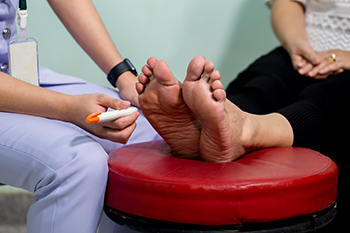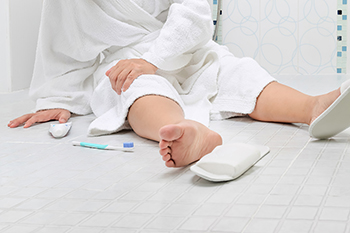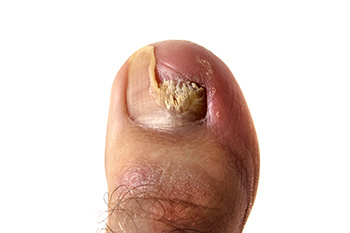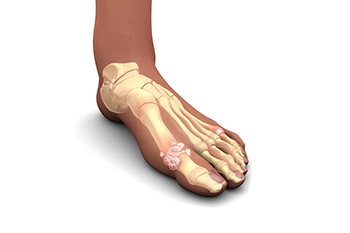Items filtered by date: October 2023
Causes and Symptoms of Diabetic Neuropathy

Diabetic neuropathy most often affects the peripheral regions or extremities, including the feet, which tend to bear the greatest brunt of diabetic nerve damage. Prolonged periods of uncontrolled high blood sugar can trigger a number of problematic conditions that can afflict your feet, collectively termed the diabetic foot. This encompasses a range of issues, ranging from neuropathy related numbness and tingling to more severe complications such as ulcers and infections. Proper diabetes management, a healthy lifestyle, and regular check ups with a podiatrist are essential for preventing or managing this condition, particularly when it affects the feet and lower limbs. Early intervention and a proactive approach to diabetic neuropathy can make a significant difference in preserving your overall well being. If you develop a cut or sore on your foot that does not show signs of healing over time or becomes infected, it is essential to consult a podiatrist as soon as possible. Burning sensations, tingling, weakness, or pain in your feet are often early signs of neuropathy, and should be addressed promptly. For help with this condition, it is suggested that you make an appointment with a podiatrist, who is medically trained to treat diabetic neuropathy.
Diabetic foot care is important in preventing foot ailments such as ulcers. If you are suffering from diabetes or have any other concerns about your feet, contact Henrietta Obidigbo, DPM from Jersey Foot and Ankle Clinic. Our doctor can provide the care you need to keep you pain-free and on your feet.
Diabetic Foot Care
Diabetes affects millions of people every year. The condition can damage blood vessels in many parts of the body, especially the feet. Because of this, taking care of your feet is essential if you have diabetes, and having a podiatrist help monitor your foot health is highly recommended.
The Importance of Caring for Your Feet
- Routinely inspect your feet for bruises or sores.
- Wear socks that fit your feet comfortably.
- Wear comfortable shoes that provide adequate support.
Patients with diabetes should have their doctor monitor their blood levels, as blood sugar levels play such a huge role in diabetic care. Monitoring these levels on a regular basis is highly advised.
It is always best to inform your healthcare professional of any concerns you may have regarding your feet, especially for diabetic patients. Early treatment and routine foot examinations are keys to maintaining proper health, especially because severe complications can arise if proper treatment is not applied.
If you have any questions please feel free to contact our office located in Freehold, NJ . We offer the newest diagnostic and treatment technologies for all your foot and ankle needs.
Home Preparations to Protect the Elderly From Falls

As we age, it is helpful for our homes to be a sanctuary of comfort and safety. For the elderly, preventing falls is paramount to maintaining independence and overall well-being. Simple yet effective home preparations can make a world of difference. This can begin by decluttering living spaces and removing tripping hazards like loose rugs or cords. Install handrails and grab bars in bathrooms and along staircases to provide stability. Adequate lighting is important, ensuring that every corner is well-lit, regardless of day or night. Non-slip mats in the bathroom and a shower chair can reduce the risk of slips and falls during bathing. Regular maintenance is essential, so fix unstable floorboards, uneven tiles, or loose handrails promptly. Falling can seriously affect the feet, and may lead to difficulty in accomplishing daily activities. If you would like more information about how to protect your elderly loved ones from falling in the household, it is suggested that you confer with a podiatrist who can offer you additional effective fall-prevention tips.
Preventing falls among the elderly is very important. If you are older and have fallen or fear that you are prone to falling, consult with Henrietta Obidigbo, DPM from Jersey Foot and Ankle Clinic. Our doctor will assess your condition and provide you with quality advice and care.
Every 11 seconds, an elderly American is being treated in an emergency room for a fall related injury. Falls are the leading cause of head and hip injuries for those 65 and older. Due to decreases in strength, balance, senses, and lack of awareness, elderly persons are very susceptible to falling. Thankfully, there are a number of things older persons can do to prevent falls.
How to Prevent Falls
Some effective methods that older persons can do to prevent falls include:
- Enrolling in strength and balance exercise program to increase balance and strength
- Periodically having your sight and hearing checked
- Discuss any medications you have with a doctor to see if it increases the risk of falling
- Clearing the house of falling hazards and installing devices like grab bars and railings
- Utilizing a walker or cane
- Wearing shoes that provide good support and cushioning
- Talking to family members about falling and increasing awareness
Falling can be a traumatic and embarrassing experience for elderly persons; this can make them less willing to leave the house, and less willing to talk to someone about their fears of falling. Doing such things, however, will increase the likelihood of tripping or losing one’s balance. Knowing the causes of falling and how to prevent them is the best way to mitigate the risk of serious injury.
If you have any questions, please feel free to contact our office located in Freehold, NJ . We offer the newest diagnostic and treatment technologies for all your foot care needs.
Plantar Warts Can Be Treated!
Strategies That May Help to Prevent Toenail Fungus

Toenail fungus, medically known as onychomycosis, can be a persistent and unsightly problem. However, staying vigilant and proactive can help you maintain healthy toenails. One of the primary prevention strategies is maintaining good foot hygiene. Regularly wash your feet with soap and water, ensuring to dry them thoroughly, especially between the toes. Keep your toenails trimmed and cut them straight across to prevent debris buildup. Opt for breathable footwear and moisture-wicking socks to reduce the risk of fungal growth in damp environments. If you visit public pools or locker rooms, it is helpful to wear shower shoes that can minimize contact with potentially contaminated surfaces. Additionally, avoid sharing personal items such as nail clippers or shoes with others. Lastly, manage underlying health conditions, as problems like diabetes or weakened immune systems can increase susceptibility to toenail fungus. If you have toenail fungus, it is strongly suggested that you speak with a podiatrist for effective treatment methods and additional prevention strategies.
For more information about treatment, contact Henrietta Obidigbo, DPM of Jersey Foot and Ankle Clinic. Our doctor can provide the care you need to keep you pain-free and on your feet.
Toenail Fungus Treatment
Toenail fungus is a condition that affects many people and can be especially hard to get rid of. Fortunately, there are several methods to go about treating and avoiding it.
Antifungals & Deterrence
Oral antifungal medicine has been shown to be effective in many cases. It is important to consult with a podiatrist to determine the proper regiment for you, or potentially explore other options.
Applying foot powder on the feet and shoes helps keep the feet free of moisture and sweat.
Sandals or open toed shoes – Wearing these will allow air movement and help keep feet dry. They also expose your feet to light, which fungus cannot tolerate. Socks with moisture wicking material also help as well.
If you have any questions please feel free to contact our office located in Freehold, NJ . We offer the newest diagnostic tools and technology to treat your foot and ankle needs.
Features of Running Shoes for Marathoners

When it comes to marathon running, a grueling 26.2-mile journey, selecting the ideal pair of running shoes can significantly affect your performance and overall foot health, as well as prevent injury. Here are some essential features to consider when choosing your marathon running shoes. Cushioning plays a vital role in marathon shoes. Select shoes with adequate midsole cushioning to absorb the shock generated by each stride. Arch support for proper foot alignment is essential to prevent overpronation or supination, either of which can lead to discomfort and potential injuries. Breathability is important, as running for extended periods can result in sweaty feet, which may lead to discomfort, infection, and even blisters. The weight of marathon shoes cannot be ignored. The lighter the shoe, the less fatigue your legs will experience over the long distance. Lastly, durability should not be underestimated. Marathon training and racing can put your shoes through significant wear and tear. To ensure your shoes last the distance, select pairs constructed from high-quality materials designed to withstand the rigors of marathon running. For additional help with selecting the right running shoes, it is suggested that you consult a podiatrist.
If you are a runner, wearing the right running shoe is essential. For more information, contact Henrietta Obidigbo, DPM from Jersey Foot and Ankle Clinic. Our doctor can provide the care you need to keep you pain-free and on your feet.
Choosing the Right Running Shoe for Your Foot Type
To increase performance and avoid the risk of injury, it is important to choose the right running shoe based on your foot type. The general design of running shoes revolves around pronation, which is how the ankle rolls from outside to inside when the foot strikes the ground.
- Neutral runners are able to choose from a wide variety of shoes, including minimalist shoes or even going barefoot.
- Runners who overpronate, or experience an over-abundance of ankle rolling, should choose shoes that provide extra motion control and stability.
- Runners who underpronate, or supinate, have feet that have high arches and lack flexibility, preventing shock absorption. They require shoes with more flexibility and cushion.
If you have any questions please feel free to contact our office located in Freehold, NJ . We offer the newest diagnostic and treatment technologies for all your foot and ankle needs.
Gout and Diet

Gout is a painful form of arthritis that occurs when uric acid crystals accumulate in the joints, most commonly affecting the big toe. While several factors contribute to gout, diet plays a significant role in triggering and exacerbating the condition. Uric acid, a byproduct of purine metabolism, can build up when the body produces too much or eliminates too little of it. Certain foods high in purines can trigger gout attacks. These can include red meat, organ meats, shellfish, and certain types of fish, such as mackerel and sardines. High fructose corn syrup, commonly found in sugary beverages, has also been linked to gout. Alcohol, especially beer and spirits, can elevate uric acid levels and increase the risk of flare-ups. To help manage gout, limit purine-rich foods and maintain a balanced diet. Staying hydrated and incorporating fruits and vegetables can help lower uric acid levels and reduce the frequency and severity of gout episodes. If you have had one or more gout attacks, it is strongly suggested that you consult a podiatrist for recommended foods that can help prevent gout.
Gout is a foot condition that requires certain treatment and care. If you are seeking treatment, contact Henrietta Obidigbo, DPM from Jersey Foot and Ankle Clinic. Our doctor will treat your foot and ankle needs.
What Is Gout?
Gout is a type of arthritis caused by a buildup of uric acid in the bloodstream. It often develops in the foot, especially the big toe area, although it can manifest in other parts of the body as well. Gout can make walking and standing very painful and is especially common in diabetics and the obese.
People typically get gout because of a poor diet. Genetic predisposition is also a factor. The children of parents who have had gout frequently have a chance of developing it themselves.
Gout can easily be identified by redness and inflammation of the big toe and the surrounding areas of the foot. Other symptoms include extreme fatigue, joint pain, and running high fevers. Sometimes corticosteroid drugs can be prescribed to treat gout, but the best way to combat this disease is to get more exercise and eat a better diet.
If you have any questions please feel free to contact our office located in Freehold, NJ . We offer the newest diagnostic and treatment technologies for all your foot and ankle needs.





